Content warning: description of suicide attempts, self-harm, depression, anxiety, eating disorder, emotional abuse, injury, violence
August 25, 2025 (Note: this article was updated August 29, 2025 to include a response from the International Skating Union)
by Izumi Yoneyama, with reporting by Anna Kellar

Latvian figure skaters are bringing forward allegations against the leaders of the Kristal Ice figure skating club in Riga. These athletes detail a pattern of physical and emotional abuse that has deeply impacted their physical and mental health. The director of Kristal Ice denies these allegations, and an investigation has been opened with the Latvian federation and the ISU.
The most well-known of the athletes speaking out is the three-time World Championship competitor Sofja Stepcenko.
In 2024, Stepcenko moved from her training base at Kristal Ice to work with Stéphane Lambiel and his team in Switzerland. As she struggled competitively in the 24-25 season, she was grappling, behind the scenes, with depression and the built-up consequences of years of trauma.
Now, the 18-year-old is taking a break from the ice and focusing on her mental health. She decided to speak out about her experiences to help others recognize the need to listen to their feelings and address mental health problems early.
She also has harsh words for her former coaches at the Kristal Ice club in Riga, Olga Kovalkova and Raimo Reinsalu, who she says were emotionally manipulative and pressured her to compete with injuries and to lose weight. These pressures, plus a culture of malicious gossip, contributed to an eating disorder, self-harm, and depression.
Stepcenko is the most prominent skater to criticise Kovalkova and Reinsalu, but she is not the only athlete bringing forward allegations. Rather, AnythingGOEs’ investigation indicates Stepcenko’s experiences may be emblematic of a broader pattern of abuse.
Recognizing the problem
This June, Sofja Stepcenko approached AnythingGOEs for an interview, and she had something to say that was very different than when our reporter had spoken to her a year earlier. In summer 2024, shortly after she had decided to move to Switzerland for training, she had sounded optimistic about her skating. Now, she wanted to explain what had really motivated her to change coaches, and the mental health problems that lay behind her difficult season.
“It feels like I came [to Switzerland] having survived something, and everything in my background just came over me…It was like a snowball, and at one point it just exploded. I came to Stéphane already broken.”

As Stepcenko described, that brokenness affected her in complicated ways. For example, she competed frequently in 2024 and early 2025, wanting to show the results she knew she was capable of and prove that she had made the right decision in switching coaches.
“I moved here with a lot of motivation to have revenge [on my former coaches] and to show that I can be without them because they told me, ‘Without us, you cannot be anyone. You cannot be a skater without us.’ So I went with the feeling that I should get revenge. I should show others that it was the right choice.”
Now, however, she thinks it was the wrong idea to have competed so much. “I should have stopped in December. But I tried to show that I don’t have problems, everything is fine. Only in February, I asked for professional help. I understood that soon I would kill myself, and I needed help.”
At that time, Stepcenko went to a psychiatrist in Switzerland, where she was diagnosed with depression and complex post-traumatic stress disorder (C-PTSD).
“I was just hiding everything,” Stepcenko explained. “You’re just wearing the mask that everything is beautiful, and that’s all. But nobody knows that, for example, five minutes ago you had a panic attack. Nobody knows that after your short program, you had a crisis so big, you thought you should take pills to stop it…I was suffering, and I tried to kill myself many times. One time, it was very close. Then my psychiatrist decided to put me in the hospital…for three weeks. They helped me with the clinical depression. I went out, and then I had one more try to kill myself, to hang myself. I told that to the psychiatrist and they put me in a hospital again for four weeks. And then they diagnosed me with borderline [personality disorder], together with PTSD.”
Lambiel and his team attempted to help Stepcenko through this time. “As a person, she’s a very smart girl,” said Lambiel. “She’s so talented. She has so much potential. And the problem is [the gap between] her physical potential and her lack of confidence was so big that we were facing a wall, working and going to competitions…she knows how capable she is, because she can do a lot of things, but she had zero confidence, and whatever we were boosting, it was dropping right away, as soon as she sees [her former coaches].”
Last spring, Stepcenko faced the difficult decision of whether to compete at Worlds. She was the only Latvian woman with the technical minimum scores to be able to compete in Boston and attempt to secure the Olympic spot for her country. Lambiel recommended that she withdraw, but ultimately left the decision to Stepcenko and her medical team.
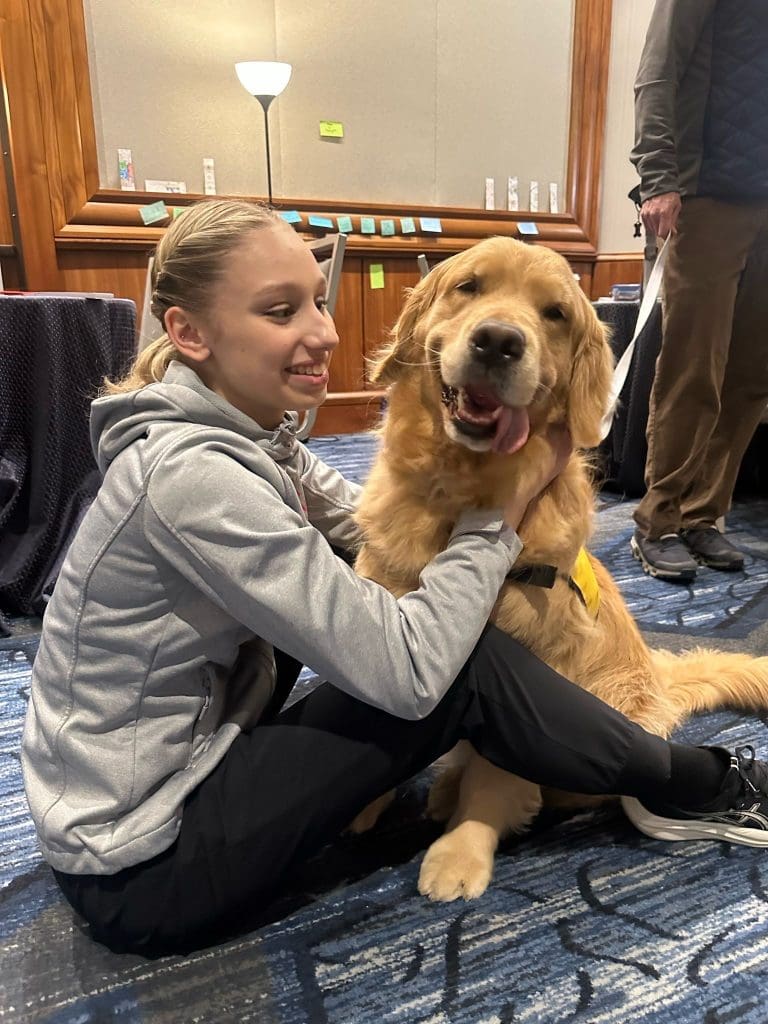
“We had a discussion, whether I should compete in the World Championship or not,” said Stepcenko. “Because when you cut your wrist and you get stitches, your psychiatrist understands that he should put you in the hospital. But you’re telling him, ‘No, no, no, no, no, it’s fine. I will complete the World Championship, I will finish the World Championship, and then I will come back and everything will be fine.’ It was like a circle after every competition.”
She finished 30th at Worlds, not qualifying for the free skate. It was a very difficult competition, but she did have one bright spot in an interaction with another competitor.
“I’m really inspired by Amber Glenn,” Stepcenko shared, “because she helped me after my short program. She supported me so much, I’m still remembering and keeping this note which she wrote because it was so supportive and it helped me…”
“It’s not worth your life”

As she explained, Stepcenko’s struggle with depression and C-PTSD is connected to the pattern of trauma and abuse she experienced earlier in her career.
From early in childhood until the end of the 2023/2024 season, Stepcenko was a member of the Kristal Ice Figure Skating Club in Riga, one of the most prominent clubs in Latvia. She was coached there by Raimo Reinsalu and Olga Kovalkova, a team that also coaches Latvian skaters such as Fedir Kulish and Kira Baranovska.
Kovalkova is the director of the Kristal Ice club, and she is also a member of the board of directors of the Latvian Skating Association (LSA). Reinsalu, who is originally Estonian, is an ISU technical specialist, and while his role at Kristal Ice is listed as a ‘consultant’, several skaters explained that he is the primary technical coach for the club.
“During [the 2024/2025 season],” said Stepcenko, “I didn’t say anything bad about my former coaches. But now it’s time to say the truth. I basically ran away from my former coaches because they were manipulative… because I was abused [and] they told a lot of gossip and lots of lies about me. They pushed me to do impossible things with injuries…they can promise to get you results, but at what cost? It’s not worth your life.”
She detailed several times when she felt pressured to compete while injured.
“One week before the 2023 World Championship in Japan, my first Worlds, I twisted my right ankle from the double Axel. I had two ligaments that were broken 90% and liquid inside the bone. I was off the ice for one week, and then I had the flight. The coaches pushed me to go to the competition. I was jumping, from the right leg, triple lutz-triple toe. Of course, the free program was impossible to skate. And [my coaches] were mad at me after the free program, [asking] why didn’t I skate well.”
This was not an isolated occurrence. “That’s what often happened,” she explained, that she would be forced to skate with injuries and be told, “‘Your injuries are your fault.’ I also had a very long-lasting injury since 2021. When I was 14, my left hip started to hurt. I was practicing so much and I told [Reinsalu] I have a pain. He told me to go to the physiotherapist. I went, it didn’t help, and he told me, ‘Why are you lying about this pain, it’s not so much.’”
“The practices were so horrible, so hard. In one of the ice sessions, I felt so dizzy, I saw black, and I was unable to see. And I needed to jump. And I jumped, and I twisted my ankle. Only after three months, I did the MRI, and they found a stress fracture in the hip. I had three months of having this stress fracture and skating. And of course, you should take a break before going back on the ice, like maybe a few months. After one month, I started to jump and I started to have the pain again, and they didn’t believe me. They were telling me, ‘You don’t have the pain. The pain is in your brain.’ Really the main slogan was, ‘the pain is in your brain.’ And you start to believe in that.”
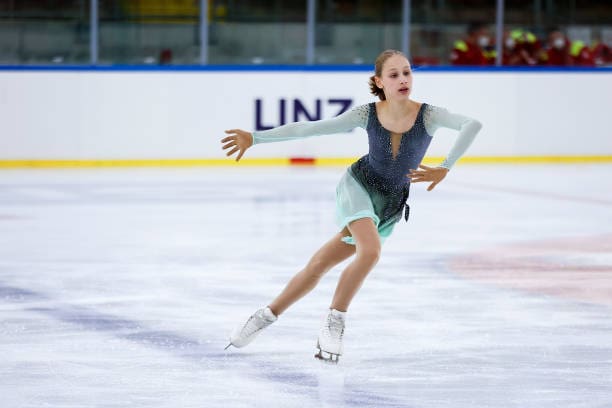
“From August until December [2021], I was really thinking I was crazy. My first two junior Grand Prix events, I was competing with a stress fracture, and then in December, I decided to go to the doctor, and they told me, ‘You have a stress fracture with necrosis inside of your bone, and half of your hamstrings are broken. If you want to be disabled, you can continue to skate. But if you don’t want that, please stop.’ And my coach told me, ‘It was because you had one and a half kilos of extra weight.’”
That accusation exacerbated another problem: from age 13, Stepcenko struggled with an eating disorder, using laxatives to control her weight. “I needed to lose weight very fast and in a short period.” Later, she began struggling with self-harm. Rather than helping her, she says her coaches bullied her. “The first time I had a problem with self-harm was in June 2023, after my first World Championship, which was not so successful. It was in summer, and I was with my ex-boyfriend. In August, Olga told him that I’m a psychopath and that he should break up with me.”
Stepcenko emphasized that the culture of gossip was particularly damaging to her mental health. She is proud that she was able to recognize for herself that something was wrong, and change her environment. “When you start to grow up, at one point in your head, something changes, like you cannot be a kid anymore. And I just stopped listening to what [the coaches] said. At the moment when I realized that all they said to me was bullshit, I stopped listening to them at all.”
“I have a lot of these stories, and you just start to understand that it’s impossible [to continue like this]. This person should be in prison.”
The coach’s response

AnythingGOEs reached out to Kovalkova in July to ask about Stepcenko’s allegations. Kovalkova responded to AnythingGOEs by email, writing that Stepcenko’s allegations against her and Reinsalu were an attempt at financial “manipulation,” and that her poor competitive results in 2024/2025 were the result of a lack of discipline.
“After she left our club, some of our girls were telling us (and their parents confirmed later) that Sofja was acting very bad towards teammates, was asking [for] money – and never returned [it], was smoking in dressing rooms (even sent me pictures), she was telling [to] our athletes that she will cut her hands or legs if they do not give her money or help her in any stupid things. Of course, we know it only now after she left, before kids were afraid to tell us these things, as they trusted her that she will cut her hands and so on. About her relations with men – it’s another part of [the] story!”
Kovalkova added that “Sofja had behaviour problems since childhood, but…we [tried to] find any solutions to help her and assist. When she was in our club (you can check our Insta pages and other pictures taken during long years), she was looking really happy – smiling, laughing, communicating.”
Kovalkova acknowledged that Stepcenko did have the injuries she described at the competitions from 2021-2023, but denied that she ever pushed Stepcenko to compete against her wishes or the doctors’ instructions.
“We acted accordingly to LOC [Latvian Olympic Committee] and LSA [Latvian Skating Association] recommendations. Sofja never took part in competitions against her own wish and confirmation of her doctors. Sometimes it was exactly the opposite – we did recommend to cancel her participation in World Champs, in [Youth Olympic Games], and a few more – but Sofja wanted to take part, told [us] that she felt good, and all the time LSA was in contact with her doctors from LOC before sending entry for serious competitions.”

AnythingGOEs also reached out to current LSA leaders about Stepcenko’s injuries. They declined to comment on the specifics as those injuries took place under a different administration. Federation president Uldis Šauers wrote in response to AnythingGOEs that, in general, “It is the athlete’s responsibility to take care of their health, coordinating all health-related matters with the Latvian Olympic Unit (LOV) sports doctor.”
AnythingGOEs also directed questions to the Latvian Olympic Unit (LOV), which began treating Stepcenko in March 2023, when she was included in the LOV program after her 11th place at Europeans. According to a representative of the LOV, “Olga Kovalkova has not consulted with the LOV representatives concerning Sofia’s health condition, as well as she has not asked for our opinion on possible participation in the competition.”
Kovalkova emphasized that she thinks Stepcenko is lying for financial gain, writing, “I have seen her ‘gofundme’ page and she was writing also to parents of our club with money askings. I see this situation as a part of manipulation. “
“If you are going to publish all those lies in this topic,” Kovalkova continued, “I think we’ll add interviews with our skaters, kids, parents and a lot of coaches who know Sofja for many years (she was travelling with us to all the camps since she was 6-7 years). As I see, she has not had results – not the financial support that she wanted – parents do not want to cover her expenses, perhaps…and she needs to find a reason to show her[self] as a victim.”
On July 8, 2025, Stepcenko posted a GoFundMe campaign titled: “Donate to help my mental illness heal”. She asked for 2,600 Swiss Francs to pay for rent and health insurance expenses to be able to stay in Switzerland and continue healing before the new season. The post did not mention anything about Stepcenko’s former coaches. On July 22nd, she posted on Instagram that she had decided to sit out the 2025-2026 season and would be closing the GoFundMe early on July 31st as she would be returning to Latvia. The campaign raised 1,567 Francs.
The other allegations
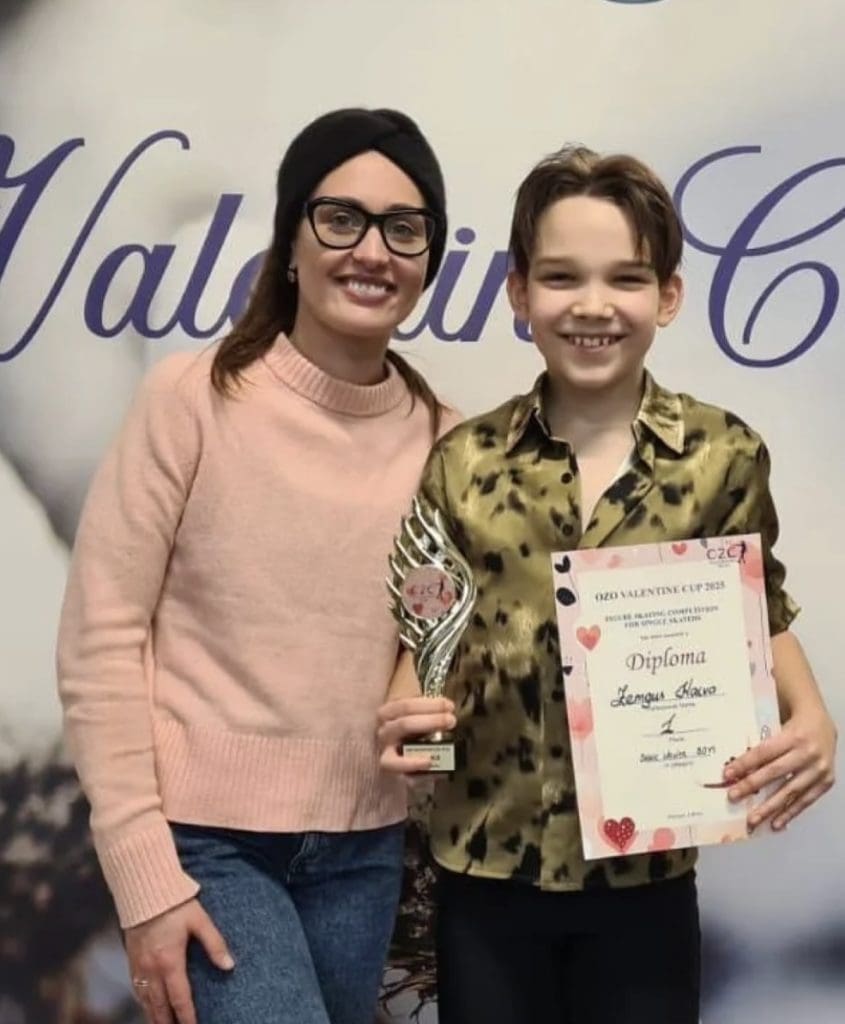
Stepcenko is the most prominent athlete to publicly speak against Kovalkova and Reinsalu. However, she is not the only one raising alarms. In March 2025, Latvian figure skating coach Karine Magone spoke to the Latvian TV show “Sporta Studija” about a series of past allegations made against Reinsalu, as well as threatening behavior that she had witnessed against other coaches.
Magone, neé Rutlauka, is a 2012 Latvian national junior champion and junior grand prix competitor who now coaches in her own club, Ice Premium School, in the suburbs of Riga. She told AnythingGOEs that she was motivated to speak up in part because of the stories told to her by two of her skaters who used to train with Reinsalu at Kristal Ice.
These skaters told her that physical abuse was common. “He would hit him with the guards for the head, and with the skates for the legs,” said Magone. Reinsalu would also force skaters to kiss his skates.
One skater told Magone how “the girls in her group needed, after every ice session, to go hug the coach, and if you don’t want to do this, [Reinsalu] said, ‘Oh, you don’t want to hug your lovely coach?’ I think it’s not normal for small girls. And he…talked about the hair and make up, he all the time said ‘you are fat, you are fat, you are fat’ and he said to such small girls, ‘you are a slut’ every training.”
Magone described another incident with a young skater, who was ten at the time. “She was jumping only doubles, and I think maybe double-double, but Raimo, in the last few minutes, five minutes of the training, said you need to make ten times the double Axel, and she was very scared because if you don’t do this, he would hit you. She went to do this double Axel for the first time in her life, and got a broken leg. She [still has] a problem with this leg.”
Magone also described the emotional trauma that continues to impact the skaters who have left Kristal Ice.
“The whole concept of the relationship between a coach and a skater, for this particular kid, was that it’s impossible that there is [a] good relationship, that there is love, and that there is decent communication. And it was very difficult at the beginning to work with this kid, because all of her [past] coaching was true violence, be it emotional or physical. You want to give a better result, I don’t know, a better life… all I can do. But the skater all the time was crying and aggressive.”
The behavior Magone described has many similarities with the account of another skater who spoke to AnythingGOEs anonymously due to fear of retaliation. This skater witnessed and experienced many incidents of emotional and physical abuse by Reinsalu.
“I was humiliated in front of other students, bullied for my weight constantly. He didn’t really look for a proper reason to bully and offend you; he was just doing it constantly and with almost everyone, except for a few favorites.” Alleged physical abuse included hitting students with skate guards and even the blade of the skate. In one incident, Reinsalu allegedly violently physically attacked a student after that skater spoke up against verbal abuse. This skater also described Reinsalu ordering skaters to practice while injured, ignoring the advice of doctors. This included pushing athletes to attempt difficult jumps despite injuries and, in at least one case, to continue practicing even after receiving a concussion.
Another point raised by this skater regarded something AnythingGOEs had heard from other sources: that even though Kovalkova is officially listed as the coach for the club’s skaters, Reinsalu does 100% of the on-ice training. Reinsalu, who is originally Estonian, does not have a Latvian coaching accreditation and is listed as a consultant to the club.
“During the training, [Kovalkova] was always sitting upstairs in the cafe, all the time talking with some moms. They were making up some crazy stories, rumors, and false information about the skaters, about the parents, which you couldn’t even believe… making up stories which are not even true.”
This anonymous skater’s testimony and Magone’s retelling of her students’ experiences reiterate several of the same elements as Stepcenko’s story. The pattern in all three cases includes physical and emotional abuse, a culture of harmful gossip, bullying about weight, and the pressure for skaters to train difficult elements when they were already injured, leading to more catastrophic injury.
Holding coaches accountable

“It’s been hard to have an actual proof that Raimo is being emotionally violent and physically violent,” noted Magone. “The only proof is basically the stories from the kids, right? And then from some parents. But there has not been actual evidence, like videos or whatever, because he’s skating in this one particular ice rink [Volvo Ice Hall] and he’s being protected by the owner of the ice rink because it’s also business for him.”
However, in one case, there was video evidence that resulted in a police report.
“During COVID, [Reinsalu] had to skate in another ice rink…where you also have video surveillance and whatnot…Basically, since it’s a different ice rink, it’s a different director of the ice rink, [there wasn’t] that same relationship, no protection. And there was this one situation where Raimo was violent against a little girl. After the incident, the parents of the girl went to the police and filed a report. And Raimo did receive a civil offense and a warning. If you have three small civil offenses, the next one is criminal.”
“In that particular case, they were able to obtain the video recordings, and there was proof,” explained Magone. “And there is an official document from the Latvian police that yes, there was this physical violence, and basically the decision was that he gets a warning. But there are in total four reports already filed against Raimo and Olga. I know these people, but these people didn’t have a result because these incidents happened in the Volvo hall. So the reports were filed, but there was no evidence because it was impossible to obtain the video recordings. They somehow disappeared. When the police went to this ice rink and asked for the recordings, they were no longer available. And the case is closed. That’s how it happens in Latvia. They don’t look into anything else.”
When Sporta Studija asked federation president Uldis Šauers about Magone’s assertion that there had been reports of abuse filed against Reinsalu, both Šauers and Reinsalu denied any of the reports had credibility. “There was blatant slander,” Šauers said. “It’s all visible on the cameras. And there have been cases where the cameras have also saved Raimo because there was a case where they even tried to extort money from him for this. There was also an investigation, and it turned out that these people already had precedents, that they tried to get money from coaches.”
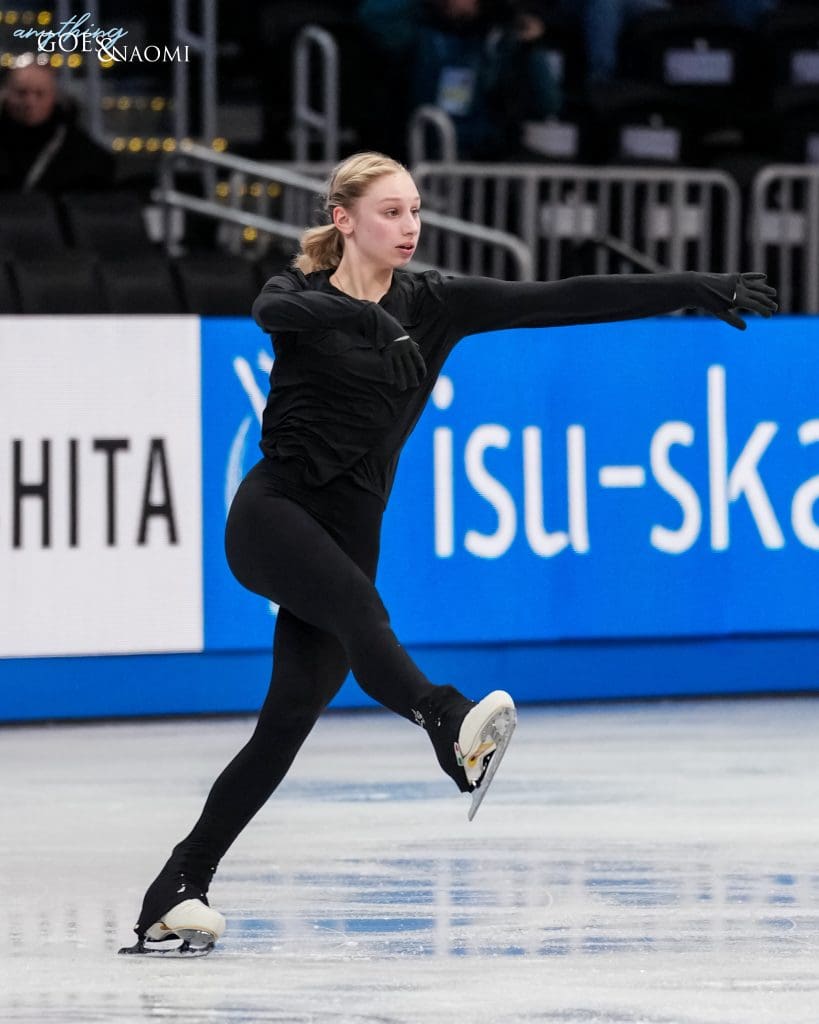
AnythingGOEs has asked the LSA for more information about these investigations, but has not received a reply.
Stepcenko first informed Šauers about Reinsalu and Kovalkova’s alleged behavior during a Zoom meeting in spring 2024. She later made formal written reports to the LSA and to the ISU safeguarding officer in early summer 2025, and brought her story to Latvian law enforcement authorities at the same time.
Šauers said in an August 12th response to AnythingGOEs, “We have recently received a complaint from Ms Stepcenko; however we need to clarify the content of the complaint and have requested additional information, which we have not yet received. Once we receive these clarifications, if necessary, we will promptly forward the information to the police…This is the first such letter from Ms Stepcenko to the current board. Since April 2024, Ms Stepcenko has not been training in Latvia, and until now we had not received any complaints from her.” Šauers has not responded to questions about the 2024 conversation with Stepcenko.
Stepcenko has expressed doubt that the LSA can effectively investigate her report because Olga Kovalkova is one of the board members. Šauers wrote to AnythingGOEs that when the board receives a complaint, “if the complaint involves a member of the Board, that person participates only to provide explanations and does not participate in the voting process, to avoid any conflict of interest.”
In response to this article and questions from AnythingGOEs, the ISU released this statement:
“The International Skating Union (ISU) is aware and concerned by the recently reported cases of abuse involving Latvian Figure skaters, and is addressing them with the utmost seriousness. A thorough investigation is underway, conducted in full respect of due process and strict confidentiality. In parallel, the ISU remains in direct contact with the skater to provide continuous support throughout the process.
The well-being of skaters is the ISU’s first priority. Safeguarding is a central pillar of the ISU Vision 2030 strategic framework, and the ISU is committed to providing skaters with a safe and secure environment. This commitment has been further reinforced through governance reforms and the adoption of a new Constitution in June 2025 (read more here).“
Healing and finding her voice
While the official investigations continue, Stepcenko hopes that by speaking up, she will be able to help other skaters.
After Worlds 2025, Stepcenko knew she needed a break from skating.

“I feel like figure skating right now gives me only anxiety. I was struggling with that for a long time, and I need to heal my soul. Until that, no competitions. And right now it’s July. Usually, in July, you should prepare your programs. But I didn’t skate, I think, since April. I didn’t do any jumps on the ice. Since June, I did some practice. But then I had one more week in the mental hospital.”
It hasn’t been easy to step away from what was the biggest part of her life. “I’m struggling with a lot of anxiety, with a lot of feelings that I’m worthless, that nobody needs me,” Stepcenko confided. “What should I do since I’m not good enough at figure skating? I mean, as you can see, after the World Championship, I wasn’t on social media. I didn’t make any posts because I went to the mental hospital.”
“It’s very hard when you’re living with the stress, like a competition stress, but always. This is how I feel. You live with competition stress all your life. All day. You wake up with competition stress. You go to sleep with competition stress. During the day, you have competition stress. It’s very hard. It’s why I want to share the videos too. I’m too tired to hide it.”
Stepcenko began to post regularly on Instagram again in June. She doesn’t want to hide her scars anymore, neither the emotional scars of her experience nor the physical scars of years of self-harm. “In my two last videos, I decided to show myself with the arms… I don’t care anymore. I struggled with so many problems, so now it’s time to show the people that’s who I am.”
Vlogging is also a way for her to show more sides of her personality.
“People see only a figure skater. They don’t understand that we are people, we have feelings, we have sadness, we have happiness, we have our own lives, we have our own hobbies. Figure skating is not the only thing I would like to do….They just want to see the beautiful picture of how she landed the triple Axel. And if she does it, she’s the best figure skater. And a lot of fans decide to stop supporting you because you stopped showing the results. But nobody knows what is going on. It’s like, if you are not good enough, nobody cares about you.”
So, who is Sofja Stepcenko, the person? She enjoys reading and loves to crochet. She has started an Instagram account, s_s.crochet, to show her creations and hopefully to sell commissioned pieces. “If people want me to do a crochet item for them, they can message me!”
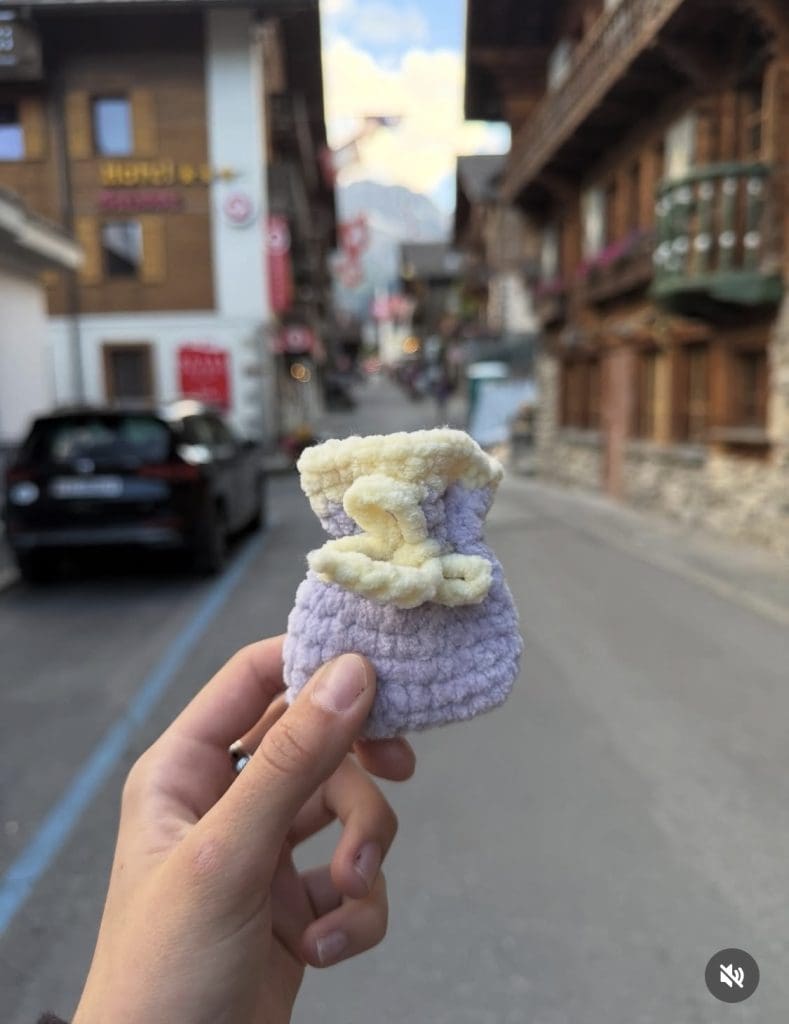
She also loves animals, especially dogs. “I will have a dog as soon as possible, a Mini Australian Shepherd. It’s my biggest dream and I’m so excited!”
Stepcenko hopes that being open about her struggles can help other young athletes. “I’m sharing my situation with my mental health because I want[s] young athletes and parents to pay attention to that. Please pay attention and trust your feelings. If you feel bad, your feelings never lie. Otherwise, in the future, you will struggle with problems like I do.”
She wants to reduce the stigma around mental health. “It’s not something you should be ashamed of or judged for. We should speak about it.”
She also encourages parents to pay attention to the warning signs and speak up. “I think the most important thing is to listen to the people around you and see the signs if something is going wrong. It’s not always easy to ask for help. It’s very hard. But if you see the signs…you can try to step- by -step help the person and ask him how he feels.”
“I know a lot of abusive parents pushing their kids. They should understand, too, that until 13, maybe 14, the kid will listen to you. But then he will start to hate you, and at 16, he will finish his career. It’s not the way you should earn the result.”
Her relationship with her parents has improved as they have learned more about her struggles with mental health. “When I was bullied, I didn’t have enough support from my parents, because they didn’t realize that it was really so bad. Now they understand it was bad, and it was something unacceptable.”
“I think because they are from the post-Soviet Union, it’s hard, but my mom tries her best to understand, and I’m really glad, because right now we have a better connection than before…She’s doing her maximum, and I’m glad for that. She’s living her first life, too.”
Stepcenko is hoping at some point to return to the ice someday. “I don’t know how my life will continue, but I know very, very well I will try to skate again.”
Lambiel is continuing to support Stepcenko, noting it is more important that she is healthy than that she compete in the future. “I wish [my skaters] to reach whatever they want to reach, but I want them as a person, to be healthy, physically, mentally, to have their feet on the ground, and that’s my wish for Sofja… I want her to have two feet on the ground and a safe space to be herself, which she didn’t have for a very long time.”
Stepcenko hopes being open about her story will help other young skaters. “We should talk about it more, because so many people are struggling with mental health. I know I’m not a big person in figure skating, but I knew that I was a good prospective figure skater at one point. But when my mental health started falling down, everything fell down, and right now I need to heal everything.”
“I’m planning to study, to have a dog, to find a job…[if my life is] with figure skating, it’s good, if it’s without figure skating, it’s good too. What I survived is really tough.”
AnythingGOEs’ investigation will continue in part 2, as we look at the options available to athlete survivors and cases of retaliation against whistleblowers and athletes who report abuse and corruption in Latvia.

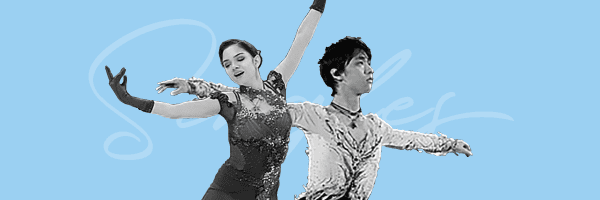
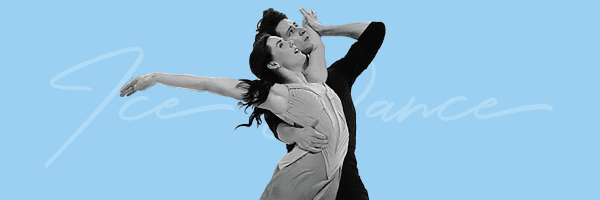
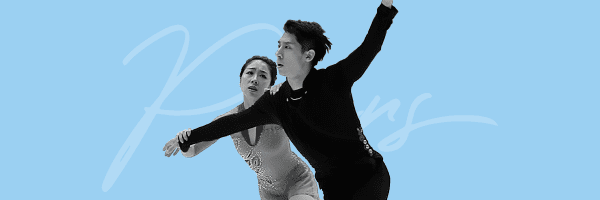
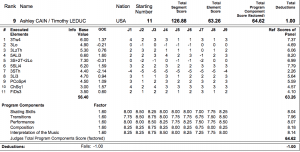
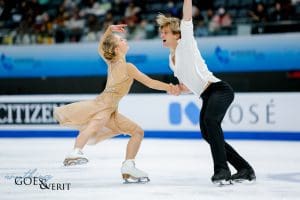
3 Replies to ““It’s not worth your life”: Latvian skaters speak out about abuse”
I skated in this club from 2012 to 2016, and I confirm that Raimo Reinsalu was always the head coach, and all trainings were conducted in Russian. I never went to psychologists or psychiatrists, but I clearly remember the constant comparisons with other girls and being told that I would always be the worst.
I can also confirm that Olga Kovalkova, together with other mothers, constantly discussed the girls from the club, gossiping like old women and accusing them of being overweight, saying they looked disgusting. Of course, this could not help but affect our self-perception.
My former coach, Raimo Reinsalu, repeatedly took offense at me, even though I was a minor, and he would ignore me for weeks on the ice, leaving me to come up with exercises on my own.
Eventually, life led me to physiotherapy, and I know that stress fractures are not caused by extra kilograms — they are called stress fractures for a reason, especially when we are talking about small, fragile athletes.
It hurts me deeply, though sadly it is not surprising, that in response to these accusations my former coach, Raimo Reinsalu, and a person who never trained us but loved to spread rumors, Olga Kovalkova, reacted with the typical excuse that it was all just about the girls’ “difficult personalities.”
We were all very traumatized and therefore angry. As for her suggestion to interview other girls, I want to say that for years they manipulated athletes, and unfortunately only a very small number of us have the strength to go against our former club and tell the truth about the toxic atmosphere that reigned in Kristal Ice.
I trained at Kristal Ice from 2012 until 2017. I never trained for elite sport — my parents never aimed to make me a champion. Figure skating was supposed to be about health and development.
From the very beginning, training took place in Russian, despite the fact that Raimo Reinsalu did not know Latvian while working in Latvia. Already then there was bullying. Raimo Reinsalu consistently humiliated children during the most vulnerable years of adolescence. I will never forget when he gathered us on the ice and said to me: “Liza, soon you will become bigger than [girl’s name]. Stop devouring food.” Such comparisons and public shaming left long-lasting damage.
I also clearly remember one of my very first practices. He expelled me from the ice. I sat on the bench, waiting, not knowing what to do. When my friend left for the locker room, I thought I should also go change, since I had been thrown out of practice. A few minutes later, Raimo Reinsalu entered the locker room carrying a hard skate cover. He hit me twice with it, saying something like: “If this is the only way you understand, then I will act like this.” I was just a child, and he felt he could behave this way because physical punishment was already a rumor in the school.
There were also humiliations in smaller, everyday situations. For example, Raimo Reinsalu deliberately scattered skate covers on the ice and forced girls to collect them. He constantly shouted, punished, exploded emotionally, and set the children against each other. Comparisons were constant — who was better, who was worse.
The school’s director, Olga Kovalkova, also contributed to this toxic environment. She repeatedly called us “invalids,” openly discussed the girls’ bodies, their weight, and appearance, and spread endless, strange, and humiliating gossip about the children.
Now, as an adult and a coach myself (not in figure skating), I can see clearly how unprofessional this environment was. Having studied anatomy and physiology, I know how dangerous such treatment is. Raimo Reinsalu had no real knowledge of training methods, no education in pedagogy, no ability to explain or communicate constructively. Instead, he broke children psychologically and physically.
I believe such individuals should not be allowed to work with children. He has already damaged many young lives, and the impact of his actions continues years later. The responsibility for enabling this environment also lies with the school’s administration.
It is completely true what people saying. There never were fairness or truth and believe coming from Olga or Raimo. Kids were all afraid of both of them, mothers also afraid of Olga. She could do a lot with her gossips. They never were true, and never based on reallity. She wanted to make enemy, she could say what ever, things what never happend, but mothers believed her. And gave these gossips to other mothers. Even club is big and somehow strong, but its all based on fear, dirty money (close relation to let’s say LT federation, which accepts some parents personal favours, so their kids are paid by federation not because of talent but because of favour). In summer camps all foreign kids were placed in groups by:1 importance of this friendship – usefull or not 2.money – if pays federation – ok, if skater comes himself-sorry, in your level we don’t have places left…Besides Kristal Ice skaters have always priority… Last camp they put my child with rotated doubles to a beginners group with single axel. When asking why, you know him, we come also to Volvo Cup, why so? They deared to call his trainer in Netherlands, to try to make a huge conflict and prove that I do not know what my son is able to (they think that parents cannot read competition scores!) but trainer couldnt say more then that kid working hard and likes what he does. So next morning Raimo again went in frightening talk with me personally in balcony of Volvo Sport Center that my son is nothing, he can’t do anything and he, Raimo, trying to help him as much as he can. According him, my son should start again from single jumps. We stopped to go to their camps, also to their Volvo Cup. Disscusting people. But for first time they can make very good imoression. Only later you can understand with who you have a deal.